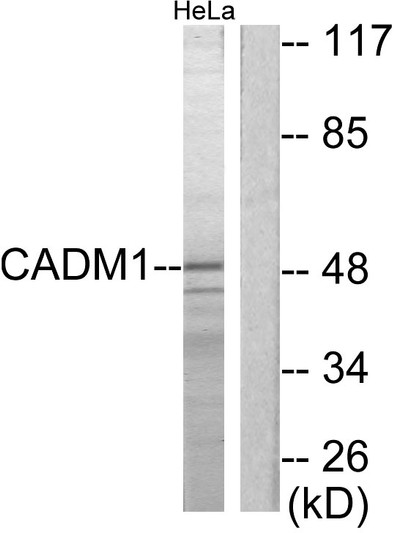| Function | Mediates homophilic cell-cell adhesion in a Ca(2+)-independent manner. Also mediates heterophilic cell-cell adhesion with CADM3 and NECTIN3 in a Ca(2+)-independent manner. Interaction with CRTAM promotes natural killer (NK) cell cytotoxicity and interferon-gamma (IFN-gamma) secretion by CD8+ cells in vitro as well as NK cell-mediated rejection of tumors expressing CADM1 in vivo. In mast cells, may mediate attachment to and promote communication with nerves. CADM1, together with MITF, is essential for development and survival of mast cells in vivo. By interacting with CRTAM and thus promoting the adhesion between CD8+ T-cells and CD8+ dendritic cells, regulates the retention of activated CD8+ T-cell within the draining lymph node. Required for the intestinal retention of intraepithelial CD4+ CD8+ T-cells and, to a lesser extent, intraepithelial and lamina propria CD8+ T-cells and CD4+ T-cells. Interaction with CRTAM promotes the adhesion to gut-associated CD103+ dendritic cells, which may facilitate the expression of gut-homing and adhesion molecules on T-cells and the conversion of CD4+ T-cells into CD4+ CD8+ T-cells. Acts as a synaptic cell adhesion molecule and plays a role in the formation of dendritic spines and in synapse assembly. May be involved in neuronal migration, axon growth, pathfinding, and fasciculation on the axons of differentiating neurons. May play diverse roles in the spermatogenesis including in the adhesion of spermatocytes and spermatids to Sertoli cells and for their normal differentiation into mature spermatozoa. Acts as a tumor suppressor in non-small-cell lung cancer (NSCLC) cells. May contribute to the less invasive phenotypes of lepidic growth tumor cells. Isoform 5: (Microbial infection) Induces cell fusion in neuron infected by a neuropathogenic strain of measles.Interacts with measles hemagglutinin to trigger hyperfusogenic F-mediated membrane fusion and presumably transsynaptic cell-to-cell transmission of the virus. |
| Protein Name | Cell Adhesion Molecule 1Immunoglobulin Superfamily Member 4Igsf4Nectin-Like Protein 2Necl-2Spermatogenic Immunoglobulin SuperfamilySgigsfSynaptic Cell Adhesion MoleculeSyncamTumor Suppressor In Lung Cancer 1Tslc-1 |
| Database Links | Reactome: R-HSA-418990Reactome: R-HSA-420597 |
| Cellular Localisation | Cell MembraneSingle-Pass Type I Membrane ProteinSynapseLocalized To The Basolateral Plasma Membrane Of Epithelial Cells In Gall Bladder |
| Alternative Antibody Names | Anti-Cell Adhesion Molecule 1 antibodyAnti-Immunoglobulin Superfamily Member 4 antibodyAnti-Igsf4 antibodyAnti-Nectin-Like Protein 2 antibodyAnti-Necl-2 antibodyAnti-Spermatogenic Immunoglobulin Superfamily antibodyAnti-Sgigsf antibodyAnti-Synaptic Cell Adhesion Molecule antibodyAnti-Syncam antibodyAnti-Tumor Suppressor In Lung Cancer 1 antibodyAnti-Tslc-1 antibodyAnti-CADM1 antibodyAnti-IGSF4 antibodyAnti-IGSF4A antibodyAnti-NECL2 antibodyAnti-SYNCAM antibodyAnti-TSLC1 antibody |
Information sourced from Uniprot.org












